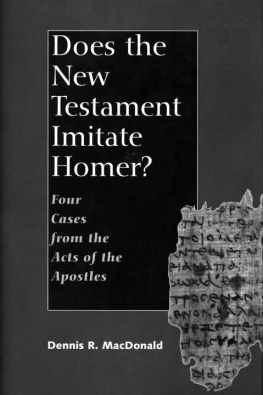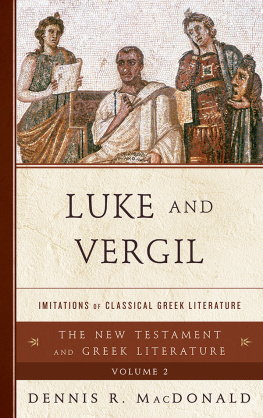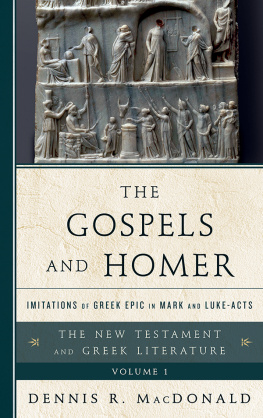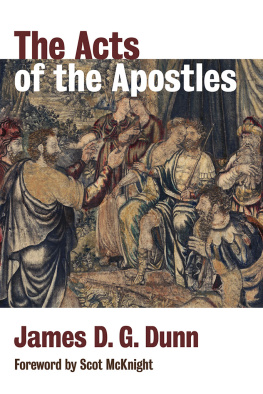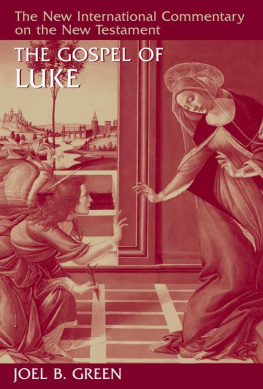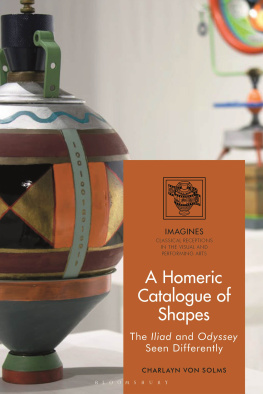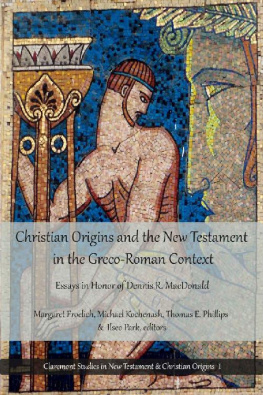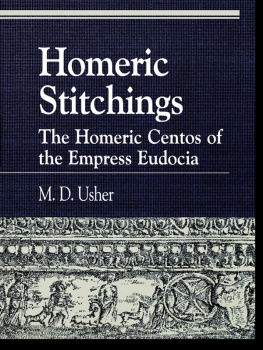Does the New Testament Imitate Homer?
DENNIS R. MACDONALD
Does the
New Testament
Imitate Homer?
FOUR CASES FROM THE
ACTS OF THE APOSTLES



For Gordon, Wynne, Don, and Treehouse
Contents
ix
i
Part One: The Visions of Cornelius and Peter and Iliad 2
Part Two: Paul's Farewell at Miletus and Iliad 6
Part Three: The Selection of Matthias and Iliad 7
Part Four: Peter's Escape from Prison and Iliad 24
Acknowledgments
At the risk of being trite, I must acknowledge that this book would have been impossible without the encouragement, efforts, abilities, and support of my students, comrades, family, and friends. Several passages are stronger for the insights of students at the Claremont School of Theology and the Claremont Graduate University, especially Ruben Dupertuis, Brett Provance, Michael Schufer, Syng Won Suh, Mariano Tomaszewski, and Young Cho, each of whom has made significant contributions to my understanding of mimesis or its application to particular texts. Michael also checked the Appendix of Greek and Latin texts for accuracy. Brett and more recently Leslie Hayes have ably administered the Institute for Antiquity and Christianity and thus freed me to pursue my research and writing with increased intensity. Olga Morales and Judy Little have provided secretarial assistance with class and care. As was the case with my previous book on Homer and the New Testament, the staff at Yale University Press has been professional, competent, and solicitous. Their reader, whoever he or she may be, made brilliant suggestions concerning improvements. A grant from the National Endowment for the Humanities allowed me to complete the manuscript earlier than otherwise would have been possible.
Amy Furth, my wife, with immeasurable grace encouraged my other passion: ancient religious literature. It is to her father, Gordon Furth, her sister Wynne Furth, and her brother-in-law Donald Brenneis that I have dedicated this book in gratitude for their friendship and support. I also have dedicated it to Treehouse, their home in Marin County, where I have spent many productive and memorable days hiking, reading, writing, and ruminating about Homer and the New Testament.
Does the New Testament Imitate Homer?
Introduction
"Who would claim that the writing of prose is not reliant on the Homeric poems?"' This rhetorical question by a teacher of rhetoric requires a negative answer: no ancient intellectual would have doubted that the Iliad and the Odyssey informed the composition of prose, including potentially the stories of the New Testament. In The Homeric Epics and the Gospel of Mark I argued that the author of the earliest Gospel used the Odyssey as his primary literary model for chapters 11-114; he used the Iliad, especially the death of Hector and the ransom of his corpse, as his model for chapters 15-16.2 I am gratified by many responses to the book, but it also has generated skepticism, criticism, and occasional hostility. It is to answer my critics that I have undertaken this book, which compares four extensive passages in the Acts of the Apostles with the Iliad.
From the outset I knew that my reading of Mark would meet resistance not only from those who read the Gospels as historically reliable but also from critically trained scholars. Most modern treatments of the Gospels and Acts view their authors as redactors, or editors, of preexisting traditions and written sources. These practitioners of form criticism divide texts into constituent units and categorize them by genre, such as parables, proverbs, prayers, prophecies, or legends of various types, like miracle stories and epiphanies. They then seek to reconstruct the geographical, linguistic, or theological environments that created and transmitted them before their articulation in the text. Many scholars would go so far as to ascribe nearly all narratives in the Gospels and Acts to historical memory or at least to tradition. Others would grant more originality to these works, but few consider literary imitation as a dominating compositional activity.
But early Christian authors not only fiddled with traditions and sources; they created stories after pagan literary models, sometimes without Jewish or Christian traditions to inform them. That is, they wrote as they had been taught in school: through tIjn1 c or imitatio.3 A contemporary of the evangelists wrote: "There can be no doubt that in art no small portion of our task [as teachers of rhetoric] lies in imitatio, since ... it is expedient to follow whatever has been invented with success."4 A historian of rhetoric claims that "Rhetorical mimesis or imitation ... became such a major interest of teachers of rhetoric that in later Hellenistic times it tended to overshadow everything else. "5 No targets for imitation were more popular than the Iliad and the Odyssey, even for the writing of prose. Whereas a form critic compares a narrative in the New Testament to other tales of the same genre as a collectivity, a "mimesis critic" will compare it with earlier texts, one or more of which might have served the author as a model. Of course, literary imitation cannot account for all stories in the Gospels and Acts, but it can account for an impressive number of them.
It is one thing to acknowledge the significance of mimesis for ancient narratives in general but quite another to recognize an imitation in a specific text. Students learned to disguise their dependence to avoid charges of pedantry or plagiarism, but mimesis often is difficult to recognize even when authors advertise their works as imitations. Today we read these texts with a cultural competence radically different from those for whom they were written; ancient readers could detect allusions invisible to all but the best-trained classicists. Even though the detection of mimesis is difficult, it is one of the most valuable contributions a critic can make for understanding a text. To be sure, one may profitably read a mimetic text for its own sake, but awareness of its model or models allows one to interpret it more comprehensively, more dialogically.6
I have designed six criteria for spotting literary imitation in ancient texts, not just in the New Testament and not just of classical poetry. I crafted the criteria to reflect descriptions of mimetic practices in Greek and Roman authors, but they apply to all types of direct literary influence.
The first two criteria assess the cultural significance of the proposed model. Accessibility, criterion one, pertains to the dating of the proposed model relative to the imitation and its physical distribution and popularity in education, art, and literature. Obviously no author can imitate a text that he or she has not read, so the more widespread the circulation and popularity of the model, the stronger the case that the author used it. Less obvious but no less important is the accessibility of the model to the intended readers. Ancient narratives often paraded themselves as rewritings of earlier ones to invite comparison; this strategy worked only if their readers knew the models well enough to get the point.
If an ancient Greek reader knew only one work of literature, it probably was the Iliad.7 One catalogue of manuscripts from Greco-Roman Egypt lists over six hundred for Homer, and most of these pertain to the Iliad.' After Homer the next best preserved authors were Demosthenes with eighty-three, Euripides with seventy-seven, and Hesiod with seventy-two. In other words, two texts survive of Homer for every text by these three authors combined. One of Luke's contemporaries spoke of Homer's popularity like this: "From the earliest age, children beginning their studies are nursed on Homer's teaching. One might say that while we were still in swathing bands we sucked from his epics as from fresh milk. He assists the beginner and later the adult in his prime. In no stage of life, from boyhood to old age, do we ever cease to drink from him."9 Reading was not the only access to the epics. Homeridae and rhapsodes were trained actors who memorized and performed the epics publicly, and visual artists repeatedly depicted Homeric scenes on coins, gems, sculpture, and vases of all sorts.1 Homer was a cultural inevitability.

